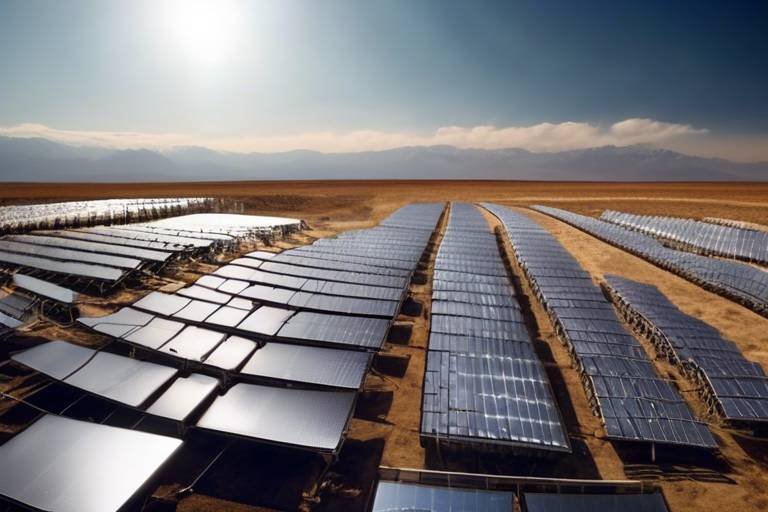How Would a Meat Tax Impact Climate Change?
The discussion around climate change is becoming increasingly urgent, and many are looking for innovative solutions to mitigate its effects. One such proposal gaining traction is the implementation of a meat tax. But how would this tax actually influence our planet's health? In this article, we will explore the multifaceted impacts of a meat tax, considering not only the environmental benefits but also the economic and social implications. By examining these aspects, we can better understand whether a meat tax could be a viable strategy in the fight against climate change.
To kick things off, it’s crucial to recognize just how much meat production contributes to greenhouse gas emissions. According to various studies, livestock farming is responsible for approximately 14.5% of global greenhouse gas emissions. This staggering figure highlights the urgent need for policy changes that could help reduce these emissions. A meat tax could serve as a powerful tool to encourage consumers to rethink their dietary choices and opt for more sustainable alternatives.
Now, let’s dive deeper into the rationale behind a meat tax. The idea is simple: by imposing a tax on meat products, we can create a financial incentive for consumers to reduce their meat consumption. This aligns with the broader goal of decreasing our carbon footprint and promoting environmental sustainability. The revenue generated from this tax could then be used to fund various environmental initiatives, public health programs, and support for farmers transitioning to more sustainable practices. It’s a win-win situation, right?
However, the implications of a meat tax are not solely environmental. They also extend into the economic realm. Imagine walking into a grocery store and seeing the price of meat slightly higher than before. Would you still choose to buy that steak, or would you consider a plant-based alternative? This shift in consumer behavior could lead to a significant decrease in meat consumption, potentially reshaping the market dynamics in favor of alternative proteins and plant-based products. With the growing popularity of veganism and vegetarianism, this transition may not be as far-fetched as it seems.
But what about the farmers? A meat tax could create challenges for livestock farmers, who might see a decline in demand for their products. This is where careful planning and government support become essential. The revenue generated from the meat tax could be allocated to help these farmers transition to sustainable practices, ensuring that they are not left behind in this evolving market. By investing in sustainable agriculture, we can create a more resilient food system that benefits everyone.
As we navigate this complex landscape, it’s important to consider the broader environmental benefits of reducing meat consumption. Lowering meat production could lead to significant reductions in greenhouse gas emissions, land use, and water consumption. For instance, did you know that producing one kilogram of beef requires approximately 15,000 liters of water? By decreasing our reliance on meat, we can preserve precious natural resources and protect biodiversity, which is often threatened by extensive livestock farming.
In summary, while the concept of a meat tax may initially seem controversial, its potential to impact climate change is profound. By reducing meat consumption, we can lower greenhouse gas emissions, promote sustainable agricultural practices, and create a more equitable food system. As we continue to grapple with the realities of climate change, it’s essential to explore all available options, including the implementation of a meat tax, to safeguard our planet for future generations.
- What is a meat tax?
A meat tax is a proposed tax on meat products aimed at reducing consumption and encouraging more sustainable dietary choices. - How would a meat tax affect meat prices?
The tax would likely increase the price of meat, which could lead consumers to consider plant-based alternatives. - What are the environmental benefits of a meat tax?
Reducing meat consumption can lower greenhouse gas emissions, decrease land use, and conserve water resources. - How could the revenue from a meat tax be used?
The revenue could fund environmental initiatives, public health programs, and support farmers transitioning to sustainable practices. - Are there alternatives to a meat tax?
Yes, alternatives include promoting plant-based diets and improving agricultural practices through incentives.

The Rationale Behind a Meat Tax
Understanding the reasons for proposing a meat tax is crucial in the fight against climate change. The environmental impact of meat production is staggering; it is responsible for a significant portion of global greenhouse gas emissions. In fact, studies suggest that livestock farming contributes to nearly 14.5% of all human-induced emissions. This is comparable to the emissions produced by all the cars, trucks, and planes combined! So, why should we consider a meat tax? The answer lies in the urgent need for policy changes that could mitigate these impacts.
Meat production is not just an environmental issue; it also raises questions about sustainability and resource allocation. The sheer amount of resources required to produce meat is immense. For example, it takes about 1,800 gallons of water to produce just one pound of beef. This is a staggering figure when you consider that many regions around the world are facing severe water shortages. Additionally, the land used for grazing livestock could be repurposed for growing crops that feed people directly, potentially alleviating global hunger.
Implementing a meat tax could serve as a financial incentive for consumers to rethink their dietary choices. If the cost of meat rises, people may be more inclined to explore plant-based alternatives, which generally have a lower environmental footprint. This shift could lead to a significant reduction in demand for meat, which, in turn, would decrease the pressure on our planet's resources.
Moreover, the revenue generated from a meat tax could be utilized for various environmental initiatives. Governments could invest this money into renewable energy projects, conservation efforts, or even subsidizing sustainable farming practices. This creates a win-win situation: not only do we reduce meat consumption, but we also fund efforts that promote environmental sustainability.
In summary, the rationale behind a meat tax is multifaceted. It addresses the pressing need to reduce greenhouse gas emissions, conserve natural resources, and promote a more sustainable food system. By enacting such a tax, we can take a significant step towards combating climate change while also fostering a healthier planet for future generations.
- What is a meat tax? A meat tax is a proposed tax on meat products aimed at reducing consumption and mitigating environmental impacts.
- How would a meat tax affect meat prices? A meat tax would likely increase the price of meat, potentially leading consumers to opt for more sustainable food choices.
- What are the environmental benefits of reducing meat consumption? Reducing meat consumption can lead to lower greenhouse gas emissions, decreased water usage, and less land degradation.

Economic Implications of a Meat Tax
When we dive into the economic implications of a meat tax, we find ourselves at a crossroads of consumer behavior, market dynamics, and government revenue. Implementing such a tax could send ripples through the economy, altering how people view and purchase meat products. Imagine walking into a grocery store and seeing the price tags on your favorite cuts of meat spike. Would you still grab that steak, or would you think twice and reach for a plant-based option instead? This shift in consumer choices could be monumental.
One of the primary effects of a meat tax would be its influence on consumer purchasing decisions. As prices rise, many consumers may begin to reconsider their meat consumption habits. This could lead to an increased demand for plant-based diets and alternative proteins, such as legumes, nuts, and meat substitutes. In fact, studies suggest that even a modest increase in meat prices could lead to a significant drop in consumption. A recent survey found that over 60% of respondents indicated they would reduce their meat intake if prices were to increase by just 10%. This behavioral shift could pave the way for a more sustainable food system.
In examining the impact of a meat tax on consumer choices, we must consider the concept of price elasticity of demand. This economic principle refers to how sensitive consumers are to changes in price. For meat products, the demand is somewhat elastic, meaning that as prices rise, consumers are likely to purchase less. This shift could lead to a cascading effect—less demand for meat could result in lower production levels, which in turn could lead to a decrease in greenhouse gas emissions associated with livestock farming.
To illustrate this concept, let's take a look at a simplified table that outlines potential changes in meat consumption based on varying price increases:
| Price Increase (%) | Estimated Decrease in Meat Consumption (%) |
|---|---|
| 10% | 5% |
| 20% | 15% |
| 30% | 25% |
As illustrated, even a modest price increase could lead to a notable reduction in meat consumption. This shift not only benefits the environment but also encourages consumers to explore healthier dietary options.
However, the implications of a meat tax extend beyond just consumer behavior. The long-term economic effects could be profound, especially for livestock farmers. As demand for meat decreases, farmers may face challenges in maintaining their livelihoods. This could lead to potential job shifts within the agricultural sector, prompting a need for retraining and support for those transitioning to alternative forms of agriculture. Governments might need to step in with initiatives that assist farmers in adapting to these changes, ensuring that the transition is as smooth as possible.
On the flip side, a meat tax could generate significant revenue for governments. This revenue could be allocated toward various initiatives, such as environmental programs, public health campaigns, and support for farmers transitioning to more sustainable practices. Imagine a scenario where the funds collected from a meat tax are funneled into community gardens, education on plant-based diets, or subsidies for farmers who choose to grow crops instead of raising livestock. Such initiatives could create a more resilient agricultural system while simultaneously benefiting public health.
In conclusion, the economic implications of a meat tax are multifaceted. While it may pose challenges for certain sectors, it also presents opportunities for positive change. By encouraging shifts in consumer behavior and generating revenue for sustainable initiatives, a meat tax could be a step toward a healthier planet and population. The question remains: are we ready to embrace such a transformative approach?
- What is a meat tax? A meat tax is a proposed tax on meat products aimed at reducing consumption and mitigating environmental impact.
- How would a meat tax affect prices? A meat tax would likely increase the prices of meat products, potentially leading consumers to seek alternatives.
- What are the benefits of a meat tax? Benefits include reduced greenhouse gas emissions, improved public health, and increased government revenue for sustainable initiatives.
- How would a meat tax impact farmers? A meat tax could challenge livestock farmers but may also provide opportunities for transitioning to sustainable practices.
- Are there alternatives to a meat tax? Yes, alternatives include public awareness campaigns and incentives for sustainable agriculture.

Impact on Consumer Choices
When we talk about a meat tax, it’s not just a matter of dollars and cents; it’s about how our choices at the grocery store could shift dramatically. Imagine walking through the meat aisle and seeing prices that make you pause, reconsider, and perhaps even rethink your entire shopping strategy. A meat tax could serve as a wake-up call, nudging consumers towards more sustainable options. This isn’t just about eating less meat; it’s about embracing a whole new way of thinking about food.
One of the most significant impacts of a meat tax would likely be a change in consumer behavior. People might start to explore plant-based diets more seriously. With meat prices climbing, alternatives like beans, lentils, and tofu could see a surge in popularity. It’s fascinating to think about how a simple tax could lead to a culinary revolution in our kitchens. As consumers become more aware of their choices, we may witness a rise in demand for alternative proteins and meat substitutes, such as:
- Quinoa
- Seitan
- Chickpeas
- Plant-based burgers
Moreover, the price elasticity of demand plays a crucial role here. If meat becomes significantly more expensive, how will consumers react? Will they cut back on their meat consumption, or will they seek out cheaper cuts? The answers to these questions can provide insights into how effective a meat tax might be in curbing meat consumption. Studies show that as prices rise, many consumers tend to switch to less expensive options or explore new dietary habits.
But let’s not forget the long-term economic effects. A meat tax could not only reshape our plates but also the entire agricultural landscape. Livestock farmers may face challenges, but it could also open doors for innovation in sustainable farming practices. As consumers shift their preferences, farmers might pivot to growing more crops for plant-based products, creating a ripple effect throughout the economy.
In summary, the impact of a meat tax on consumer choices is multifaceted. It could lead to a significant shift in dietary habits, increased interest in sustainable food sources, and a reimagining of our agricultural systems. As we weigh the pros and cons, it’s essential to consider how these changes not only affect our wallets but also our health and the planet.
- What is a meat tax? A meat tax is a proposed tax on meat products aimed at reducing consumption and mitigating environmental impacts.
- How would a meat tax affect prices? A meat tax would likely increase the price of meat, encouraging consumers to consider alternative protein sources.
- Are there alternatives to a meat tax? Yes, alternatives include promoting plant-based diets and improving agricultural practices without imposing taxes.
- Will a meat tax affect low-income families? There is concern that a meat tax could disproportionately affect low-income communities, which is why measures for equitable access to food are essential.

Price Elasticity of Demand
The concept of is crucial when evaluating the impact of a meat tax on consumer behavior. Essentially, this economic principle measures how sensitive consumers are to price changes. When we consider a meat tax, we need to ask ourselves: how likely are people to cut back on their meat consumption if prices rise? The answer to this question can help us understand the broader implications of such a tax.
In general, if a product has high price elasticity, a small increase in price will lead to a significant drop in quantity demanded. Conversely, if a product is inelastic, consumers will continue to buy it even if prices rise. Meat, for many, is a staple in their diet, making it a bit tricky. But studies suggest that certain types of meat, especially red meat, often exhibit higher elasticity compared to chicken or fish. This means a tax on beef might lead to a notable decrease in consumption, while a tax on chicken might not have as dramatic an effect.
To illustrate this, let’s consider a hypothetical scenario where a meat tax is implemented:
| Type of Meat | Current Price ($) | Tax Impact (%) | New Price ($) | Estimated Change in Demand (%) |
|---|---|---|---|---|
| Beef | 10.00 | 20 | 12.00 | -30 |
| Pork | 8.00 | 15 | 9.20 | -20 |
| Chicken | 5.00 | 10 | 5.50 | -5 |
As shown in the table above, a significant tax on beef could lead to a 30% decrease in demand, while the impact on chicken is minimal at just 5%. This indicates that consumers are more likely to reduce their beef consumption in response to price increases compared to chicken. Understanding these dynamics is essential for policymakers when considering the potential effectiveness of a meat tax.
Moreover, the concept of substitution plays a role here. When the price of beef rises, consumers may turn to cheaper alternatives like chicken or plant-based proteins. This shift not only affects demand for meat but also encourages a broader transition towards alternative diets, which can have substantial environmental benefits. Thus, the elasticity of demand for meat can significantly influence the success of a meat tax in achieving its intended goals of reducing consumption and lowering greenhouse gas emissions.

Long-term Economic Effects
When we talk about the long-term economic effects of a meat tax, we're diving into a complex web of consequences that ripple through various sectors of the economy. Imagine the meat industry as a giant tree; if we start to prune its branches, the entire ecosystem surrounding it will respond in ways we might not anticipate. On one hand, we could see a decline in meat consumption leading to reduced sales for livestock farmers. This could create a financial strain on those who rely heavily on meat production for their livelihood. However, it’s important to note that this shift could also open up new avenues for innovation and growth in alternative protein sources.
As consumer preferences evolve, we may witness a significant uptick in demand for plant-based products and lab-grown meats. This transition could spur job creation in sectors focused on sustainable agriculture and food technology. The question then arises: will the workforce be ready to pivot? Training programs and educational initiatives will be essential to equip farmers and workers with the skills needed to thrive in a changing market.
Additionally, the meat tax could generate substantial revenue for governments. This influx of funds could be allocated to support farmers transitioning to more sustainable practices, thereby softening the blow of reduced meat sales. Imagine a scenario where the government invests in programs that promote agroecology or regenerative farming—this could not only help farmers adapt but also enhance the overall resilience of our food systems.
However, there are potential downsides to consider. Livestock farmers might struggle to keep their businesses afloat in the face of declining demand, leading to job losses and economic instability in rural communities. To mitigate these impacts, it will be crucial for policymakers to craft strategies that ensure a just transition for affected workers and communities. This could include:
- Financial support for farmers adapting to new agricultural practices
- Investment in research and development for sustainable farming technologies
- Creation of community programs to help displaced workers find new employment opportunities
In conclusion, the long-term economic effects of a meat tax are multifaceted. While it may initially disrupt the meat industry, it also presents an opportunity to reshape our food systems towards sustainability. By investing in education and support for farmers, we can create a more resilient economy that benefits both the planet and its people.
- What is a meat tax? A meat tax is a proposed tax on meat products aimed at reducing consumption and mitigating environmental impacts associated with meat production.
- How would a meat tax affect prices? A meat tax could increase the price of meat, potentially leading consumers to seek alternative protein sources.
- What are the environmental benefits of reducing meat consumption? Reducing meat consumption can lead to lower greenhouse gas emissions, less land and water use, and better preservation of biodiversity.
- Are there alternatives to a meat tax? Yes, alternatives include promoting plant-based diets, improving agricultural practices, and launching public awareness campaigns.

Government Revenue and Allocation
Implementing a meat tax could open the floodgates to a new stream of government revenue, which, if allocated wisely, has the potential to make a significant impact on environmental and public health initiatives. Imagine this: every time someone buys a steak or a burger, a portion of that cost could be directed towards initiatives that promote sustainability and well-being. This concept not only helps to offset the environmental costs associated with meat production but also provides the necessary funds to support communities in transitioning towards more sustainable practices.
With the revenue generated from a meat tax, governments could fund a variety of programs aimed at addressing climate change and promoting public health. For instance, a portion of the funds could be allocated to:
- Environmental Initiatives: Investing in renewable energy projects, reforestation programs, and conservation efforts that combat the adverse effects of climate change.
- Public Health Programs: Creating campaigns that educate the public about the benefits of reducing meat consumption, thus promoting healthier lifestyles and diets.
- Support for Farmers: Offering financial assistance and resources to farmers who are transitioning from traditional livestock farming to sustainable agricultural practices.
Moreover, the allocation of these funds could be structured in a way that ensures transparency and accountability. By establishing a dedicated fund specifically for sustainability and public health, governments can track how the money is spent and measure its impact. This not only builds public trust but also encourages broader acceptance of the meat tax as a necessary step towards a healthier planet.
To illustrate the potential impact of this revenue allocation, consider the following table that outlines possible funding distributions:
| Program | Percentage of Revenue Allocation | Estimated Annual Funding (based on $1 billion revenue) |
|---|---|---|
| Environmental Initiatives | 40% | $400 million |
| Public Health Programs | 30% | $300 million |
| Support for Farmers | 20% | $200 million |
| Research and Development | 10% | $100 million |
This table provides a glimpse into how a meat tax could translate into actionable funding that addresses climate change while supporting public health and sustainable agriculture. By strategically allocating funds, governments can create a ripple effect that not only reduces meat consumption but also fosters a healthier, more sustainable future for all.

Environmental Benefits of Reducing Meat Consumption
When we talk about reducing meat consumption, we're not just discussing dietary choices; we're diving into a significant opportunity to combat climate change. The environmental benefits of cutting down on meat are both profound and multifaceted, impacting everything from greenhouse gas emissions to water usage. Imagine a world where our plates are filled with vibrant vegetables and hearty grains instead of just meat. This shift could lead to a healthier planet!
First and foremost, one of the most pressing issues is the greenhouse gas emissions associated with meat production. Livestock farming is a major contributor to these emissions, with studies indicating that it accounts for approximately 14.5% of all human-induced emissions globally. By reducing our meat consumption, we could significantly lower these numbers. For instance, if everyone in the U.S. reduced their meat intake by just 20%, it could be equivalent to taking 7.6 million cars off the road! That's a staggering impact, isn't it?
Moreover, the environmental footprint of meat production extends beyond just emissions. It also involves extensive land use and water consumption. The land needed to raise livestock and grow animal feed is enormous. In fact, it takes about 1,800 gallons of water to produce just one pound of beef. To put this into perspective, consider this table:
| Type of Meat | Water Required (Gallons per Pound) |
|---|---|
| Beef | 1,800 |
| Pork | 600 |
| Chicken | 500 |
| Vegetables | 39 |
This stark contrast highlights how reducing meat consumption can lead to significant water conservation. By shifting towards a more plant-based diet, we can alleviate some of the pressure on our precious water resources.
Additionally, reducing meat consumption can play a crucial role in preserving biodiversity. The expansion of livestock farming has led to habitat destruction, threatening countless species. By consuming less meat, we can help reduce the demand for land conversion, thereby protecting natural habitats. This is not just about saving the animals; it's about maintaining the balance of our ecosystems. Healthy ecosystems are vital for our survival, providing us with clean air, water, and fertile soil.
In conclusion, the environmental benefits of reducing meat consumption are clear and compelling. From lowering greenhouse gas emissions to conserving water and preserving biodiversity, the case for a meat tax becomes even stronger when we consider these factors. It’s not just about making changes on an individual level; it’s about collectively moving towards a more sustainable future. So, the next time you sit down for a meal, think about the impact of your choices—not just on your health, but on the health of our planet!
- What is a meat tax? A meat tax is a proposed tax on meat products aimed at reducing consumption and lowering environmental impacts.
- How would a meat tax affect prices? A meat tax would likely increase the price of meat, which could lead consumers to choose more plant-based options.
- Are there alternatives to a meat tax? Yes, alternatives include promoting plant-based diets, improving agricultural practices, and implementing public awareness campaigns.
- What are the health benefits of reducing meat consumption? Reducing meat consumption can lead to lower risks of chronic diseases, improved heart health, and better overall nutrition.

Greenhouse Gas Emissions Reduction
The link between meat production and greenhouse gas emissions is a hot topic in climate discussions. Did you know that livestock farming is responsible for approximately 14.5% of global greenhouse gas emissions? This staggering figure is primarily due to methane, nitrous oxide, and carbon dioxide released during various stages of meat production. By implementing a meat tax, we could potentially see a significant reduction in these emissions. But how exactly would this work?
First, let's consider consumer behavior. When faced with higher prices due to a meat tax, many consumers might opt for plant-based alternatives. This shift could lead to a decrease in overall meat consumption, which directly correlates with lower emissions. For instance, studies have shown that reducing meat intake by just 50 grams per day can result in a reduction of approximately 0.1 to 0.5 gigatons of CO2 emissions annually. Imagine the cumulative effect if a substantial portion of the population made similar changes!
Moreover, a meat tax could incentivize farmers to adopt more sustainable practices. By shifting the focus from livestock to crops that require fewer resources and produce lower emissions, we could see a transformation in our agricultural landscape. For example,
- Improved crop rotation techniques
- Reduced use of fertilizers
- Increased investment in renewable energy sources for farming operations
It's also essential to highlight that the environmental benefits of reducing meat consumption extend beyond just greenhouse gases. A decrease in meat production means less land is needed for grazing and feed crops, which can lead to reforestation and the preservation of natural habitats. This is crucial for combating climate change, as forests act as carbon sinks, absorbing CO2 from the atmosphere.
In summary, while a meat tax may seem like a controversial approach, the potential for is significant. By encouraging a shift in consumer behavior and promoting sustainable agricultural practices, we can make a substantial impact on our climate goals. The question remains: Are we ready to embrace these changes for a healthier planet?
- What is a meat tax? A meat tax is a proposed levy on meat products aimed at reducing consumption and lowering greenhouse gas emissions associated with meat production.
- How would a meat tax affect prices? A meat tax would likely increase the price of meat products, which could lead consumers to consider alternative protein sources.
- What are some alternatives to a meat tax? Alternatives include promoting plant-based diets, improving agricultural practices, and implementing public awareness campaigns about the environmental impacts of meat consumption.
- Can a meat tax help with climate change? Yes, by reducing meat consumption, a meat tax can lead to lower greenhouse gas emissions and contribute to climate change mitigation efforts.

Preservation of Biodiversity
The relationship between meat production and biodiversity is a complex yet critical issue that deserves our attention. As we delve into the topic of biodiversity preservation, it's essential to understand that our choices regarding meat consumption directly impact the ecosystems around us. The agricultural practices associated with meat production often lead to habitat destruction, overgrazing, and pollution, all of which threaten the delicate balance of our planet's biodiversity.
When forests are cleared to create pastureland for livestock or to grow feed crops, countless species lose their homes. This deforestation not only reduces the habitat available for wildlife, but it also contributes to the loss of genetic diversity, which is vital for ecosystems to thrive. In fact, studies suggest that livestock farming is one of the leading causes of species extinction worldwide. By implementing a meat tax, we could encourage a shift towards more sustainable agricultural practices that prioritize biodiversity. This tax could serve as a financial deterrent to excessive meat consumption, ultimately leading to a decrease in the demand for land-intensive livestock farming.
Moreover, a meat tax could incentivize farmers to adopt practices that enhance biodiversity. For example, agroecological methods, which integrate crops and livestock in a way that mimics natural ecosystems, can help restore habitats and promote a diverse range of species. By redirecting the revenue generated from a meat tax into programs that support sustainable farming and conservation efforts, we can create a win-win situation for both the environment and our food systems.
In summary, the preservation of biodiversity is intricately linked to our meat consumption patterns. By reducing our reliance on meat through economic measures like a meat tax, we can take significant steps toward protecting our planet's rich tapestry of life. As we consider the future of our food systems, it's crucial to recognize that every bite we take has the potential to either harm or heal our ecosystems.
- What is a meat tax? A meat tax is a proposed tax on meat products intended to reduce consumption and encourage more sustainable eating habits.
- How does meat consumption affect biodiversity? Meat production can lead to habitat destruction, overgrazing, and pollution, which threaten various species and ecosystems.
- What are the benefits of reducing meat consumption? Reducing meat consumption can lower greenhouse gas emissions, preserve biodiversity, and promote healthier diets.
- Can a meat tax support farmers? Yes, revenue from a meat tax can be allocated to support farmers transitioning to sustainable practices.

Social and Ethical Considerations
Implementing a meat tax is not just an economic or environmental issue; it also raises a plethora of social and ethical questions that warrant careful consideration. How do we balance the need for sustainable practices with the realities of cultural traditions and economic disparities? These questions are essential as we navigate the complex landscape of food consumption and its impact on our planet.
One of the most pressing concerns revolves around food equity. A meat tax could disproportionately affect low-income communities who may rely on affordable meat as a primary source of protein. Imagine a family struggling to make ends meet; for them, a sudden increase in meat prices could mean sacrificing essential nutrients from their diet. It’s crucial to consider how a meat tax could be structured to ensure that everyone has access to nutritious food, regardless of their economic status. Measures could include:
- Subsidizing plant-based alternatives to make them more affordable.
- Implementing food vouchers for low-income families to offset the cost of nutritious foods.
- Supporting local food banks to ensure they can provide diverse food options.
Moreover, cultural perspectives on meat consumption play a significant role in how a meat tax would be received by the public. In many cultures, meat is not just food; it’s part of tradition, celebration, and identity. For instance, consider a family gathering where meat is the centerpiece of the meal. A tax on meat could be perceived as an attack on cultural practices, leading to resistance and pushback. Therefore, it’s vital to engage communities in discussions about dietary changes and to respect their cultural beliefs while promoting sustainability.
Additionally, the ethical implications of a meat tax extend to the treatment of farmers and livestock producers. Many of these individuals have dedicated their lives to animal husbandry and may feel threatened by such a policy. It’s essential to include provisions that support farmers transitioning to more sustainable practices, such as:
- Financial assistance for those who wish to shift towards plant-based farming.
- Training programs to help farmers adopt sustainable agricultural practices.
- Market access for alternative protein sources.
By addressing these social and ethical considerations, we can foster a more inclusive dialogue about the potential benefits of a meat tax. It’s not just about reducing consumption but also about creating a fair and equitable food system that respects cultural values while promoting environmental sustainability.
Q: What is a meat tax?
A meat tax is a proposed tax on meat products aimed at reducing consumption and encouraging more sustainable dietary choices.
Q: How would a meat tax affect low-income families?
A meat tax could increase the price of meat, potentially making it less affordable for low-income families unless measures are taken to subsidize alternatives or provide food vouchers.
Q: What are the cultural implications of a meat tax?
Meat holds significant cultural value in many societies. A meat tax could be seen as an infringement on cultural practices, leading to resistance from communities.
Q: How can farmers adapt to a meat tax?
Farmers can adapt through financial assistance, training programs, and support for transitioning to sustainable practices, including plant-based farming.

Food Equity and Accessibility
When considering a meat tax, one cannot ignore the critical issue of food equity and accessibility. The reality is that a tax on meat could disproportionately affect low-income communities, where budget constraints already limit access to nutritious food options. Imagine a family trying to stretch their grocery budget; a sudden increase in meat prices could force them to make tough choices, potentially sacrificing protein-rich foods for cheaper, less nutritious alternatives. This raises an essential question: how do we ensure that everyone, regardless of their economic status, can still access healthy food?
To tackle this issue, it's vital to explore strategies that can mitigate the impact of a meat tax on vulnerable populations. One approach could be the implementation of subsidies for plant-based foods, making them more affordable and appealing. In addition, governments could consider providing food vouchers or financial assistance specifically aimed at helping low-income families purchase healthier food options. These measures could help bridge the gap, ensuring that the shift towards reduced meat consumption does not come at the expense of those who can least afford it.
Moreover, community programs can play a significant role in promoting food equity. Initiatives such as community gardens, local farmers' markets, and educational workshops on nutrition can empower individuals to make healthier choices while also fostering a sense of community. By encouraging local food production and consumption, we can not only improve access to nutritious food but also support local economies. For instance, if communities come together to grow their own vegetables and fruits, they can reduce dependency on expensive meat products and create a more sustainable food system.
In summary, while a meat tax could bring about necessary changes in consumption patterns, it is crucial to approach the issue of food equity with sensitivity and foresight. We must ensure that all individuals have the opportunity to access healthy and sustainable food options, regardless of their financial situation. By implementing supportive measures and fostering community engagement, we can create a more equitable food landscape that benefits everyone.
- What is a meat tax? A meat tax is a proposed tax on meat products aimed at reducing consumption and mitigating the environmental impacts associated with meat production.
- How would a meat tax affect low-income families? A meat tax could lead to higher prices for meat, which may disproportionately impact low-income families who rely on affordable protein sources.
- Are there alternatives to a meat tax? Yes, alternatives include promoting plant-based diets, improving agricultural practices, and implementing public awareness campaigns to encourage sustainable eating habits.
- What measures can be taken to ensure food equity? Subsidies for plant-based foods, food vouchers for low-income families, and community programs can help ensure equitable access to nutritious food.

Cultural Perspectives on Meat Consumption
When it comes to meat consumption, culture plays a pivotal role in shaping our attitudes and behaviors. In many societies, meat is not just food; it is a symbol of wealth, tradition, and social status. For instance, in numerous cultures, serving meat during festive occasions is a way to express hospitality and generosity. Think about it: how many family gatherings or celebrations revolve around a grand roast or a barbecue? This cultural significance can make the idea of a meat tax feel like an attack on cherished traditions.
Moreover, the acceptance of a meat tax can vary significantly based on cultural beliefs. In some regions, particularly where vegetarianism is a norm, the idea of reducing meat consumption might be more readily embraced. However, in cultures where meat is a dietary staple, such as in many Western countries, the resistance to such a tax could be strong. People may perceive it as an infringement on their dietary choices and cultural identity. This raises the question: how do we balance cultural practices with the urgent need to address climate change?
Additionally, the emotional connection to meat consumption cannot be overlooked. For many, the act of sharing a meal that includes meat is deeply ingrained in family traditions and cultural rituals. These meals often carry stories, memories, and a sense of belonging. Therefore, any policy change, such as a meat tax, must consider these emotional ties. It’s not just about economics or environmental impact; it’s about people's lives and identities.
To navigate these complexities, it may be helpful to implement educational campaigns that highlight the environmental benefits of reducing meat consumption while respecting cultural practices. Engaging communities in conversations about sustainable eating can foster understanding and acceptance. By addressing cultural perspectives and involving community leaders in discussions, we can create a more inclusive dialogue around dietary changes.
Ultimately, the challenge lies in finding a balance between respecting cultural traditions and promoting sustainable practices. As we move forward, it is essential to consider how a meat tax could be framed in a way that resonates with cultural values. Perhaps it could be positioned not as a punitive measure, but as a means to support local farmers who practice sustainable agriculture or as a way to fund community health initiatives. By doing so, we can create a narrative that aligns with both cultural values and environmental goals.
- What is a meat tax? A meat tax is a proposed policy that would impose a financial charge on the sale of meat products to reduce consumption and mitigate environmental impacts.
- How would a meat tax affect my grocery bill? A meat tax could increase the price of meat, potentially leading consumers to consider alternative protein sources or reduce their overall meat consumption.
- Are there any countries that have implemented a meat tax? Some countries and regions have discussed or implemented similar taxes, focusing on reducing meat consumption for health and environmental reasons.
- What are some alternatives to a meat tax? Alternatives include promoting plant-based diets, improving agricultural practices, and implementing educational campaigns about sustainable eating.

Alternative Solutions to Combat Climate Change
While the idea of a meat tax may spark heated debates, it’s essential to recognize that there are numerous alternative solutions to tackle climate change. These alternatives not only aim to reduce greenhouse gas emissions but also promote sustainable living practices that can benefit both the planet and its inhabitants. One of the most straightforward approaches is to encourage plant-based diets. By shifting our focus from meat-centric meals to more plant-based options, we can significantly lower our carbon footprint. Imagine swapping a steak dinner for a hearty lentil stew; not only is it delicious, but it also leaves a lighter mark on the environment.
Another viable strategy involves improving agricultural practices. Modern farming techniques can be detrimental to the environment, contributing to soil degradation, water pollution, and high emissions. By adopting sustainable farming methods, such as crop rotation, organic farming, and integrated pest management, farmers can produce food more efficiently and with less environmental impact. These practices not only enhance biodiversity but also improve soil health, ensuring that we can continue to grow food sustainably for future generations.
Moreover, the implementation of incentives for sustainable agriculture can encourage farmers to adopt eco-friendly practices. Governments and organizations can offer financial support or tax breaks for those who implement sustainable methods. This not only helps farmers transition but also promotes a culture of sustainability within the agricultural sector. For instance, farmers who plant cover crops or reduce chemical inputs can receive monetary incentives, making it more appealing to shift away from traditional practices that harm the environment.
Education and awareness play a crucial role in promoting dietary changes and reducing meat consumption without the need for taxation. Public awareness campaigns can inform consumers about the environmental impacts of their food choices and encourage them to make more sustainable selections. These campaigns can take various forms, from social media initiatives to community workshops that highlight the benefits of plant-based diets. When people are educated about the consequences of their eating habits, they are more likely to make informed decisions that benefit both their health and the planet.
In conclusion, while a meat tax could serve as a tool to combat climate change, it is vital to explore these alternative solutions that can work in tandem with or even replace such measures. By promoting plant-based diets, improving agricultural practices, incentivizing sustainable farming, and raising public awareness, we can create a multi-faceted approach to tackling climate change. Together, these strategies can pave the way for a healthier planet and a more sustainable future.
- What is a meat tax? A meat tax is a proposed tax on the production and consumption of meat to reduce its environmental impact and encourage healthier eating habits.
- How does reducing meat consumption help the environment? Reducing meat consumption can lead to lower greenhouse gas emissions, decreased land use, and reduced water consumption, all of which contribute to mitigating climate change.
- Are there alternatives to a meat tax? Yes, alternatives include promoting plant-based diets, improving agricultural practices, and implementing public awareness campaigns about sustainable eating.
- How can I support sustainable agriculture? You can support sustainable agriculture by purchasing organic products, participating in local farmers' markets, and advocating for policies that promote eco-friendly farming practices.

Incentives for Sustainable Agriculture
As the world grapples with the pressing challenges of climate change and food security, the role of sustainable agriculture has never been more critical. can pave the way for farmers to adopt eco-friendly practices that not only benefit the environment but also enhance their livelihoods. Imagine a farm where the soil is rich and healthy, water is conserved, and biodiversity flourishes—this is the vision that sustainable agriculture aims to achieve. But how do we get there? The answer lies in providing farmers with the right incentives.
One effective approach is through financial incentives that reward farmers for implementing sustainable practices. These could include grants, tax breaks, or subsidies aimed at reducing the cost of transitioning to organic farming or adopting regenerative practices. For instance, a farmer who chooses to implement cover cropping or crop rotation could receive direct financial support, making it easier for them to invest in these environmentally friendly techniques. The idea is simple: when farmers see a tangible economic benefit, they are more likely to embrace sustainability.
Moreover, educational programs play a pivotal role in promoting sustainable farming. By providing farmers with access to knowledge about sustainable practices, they can make informed decisions that enhance productivity while minimizing environmental impact. Workshops, seminars, and online resources can empower farmers with the tools they need to thrive in a changing climate. Just think of it as equipping them with a toolkit that not only helps them grow crops but also nurtures the planet.
Another avenue for incentivizing sustainable agriculture is through market access. Establishing partnerships between farmers and retailers can create demand for sustainably produced goods. For example, local grocery stores and restaurants can prioritize sourcing from farms that adhere to sustainable practices, ensuring that these farmers have a reliable market for their products. This not only boosts the farmers' income but also encourages more producers to consider sustainable methods.
To illustrate the potential impact of these incentives, consider the following table that outlines various incentives and their benefits:
| Incentive Type | Description | Potential Benefits |
|---|---|---|
| Financial Grants | Direct funding for implementing sustainable practices. | Lower transition costs, increased adoption of eco-friendly methods. |
| Tax Breaks | Reductions in taxes for sustainable farming operations. | Increased profitability, more resources for sustainable investments. |
| Education Programs | Workshops and training on sustainable practices. | Enhanced knowledge, better decision-making, increased yields. |
| Market Access | Partnerships with retailers for sustainably sourced products. | Stable income, incentive for more farmers to adopt sustainable practices. |
Additionally, community-supported agriculture (CSA) programs can serve as a model for incentivizing sustainable practices. In a CSA, consumers buy shares of a farm's harvest in advance, providing farmers with upfront capital to invest in sustainable methods. This creates a direct connection between consumers and farmers, fostering a community that values sustainability. It’s like having a direct line to your food source, ensuring that sustainability is at the forefront of agricultural practices.
In conclusion, the path to sustainable agriculture is paved with various incentives that can transform the way we produce food. By combining financial support, education, market access, and community involvement, we can encourage farmers to adopt practices that not only benefit their bottom line but also contribute to a healthier planet. As we move forward, it’s essential to remember that supporting sustainable agriculture is not just about the environment; it’s about creating a resilient food system that can withstand the challenges of tomorrow.
- What is sustainable agriculture? Sustainable agriculture refers to farming practices that prioritize environmental health, economic profitability, and social equity.
- How do incentives help farmers? Incentives provide financial support, education, and market access, making it easier for farmers to adopt sustainable practices.
- Can consumers play a role in promoting sustainable agriculture? Yes, consumers can support sustainable agriculture by choosing products from local farmers and participating in community-supported agriculture programs.
- What are some examples of sustainable farming practices? Examples include crop rotation, cover cropping, organic farming, and integrated pest management.

Public Awareness Campaigns
Public awareness campaigns play a pivotal role in shaping perceptions and behaviors regarding meat consumption and its environmental impacts. Imagine a world where people are not just aware of the consequences of their dietary choices but are also motivated to make changes. This is where effective campaigns come into play. They serve as a bridge, connecting scientific findings about climate change with everyday choices made by consumers. By utilizing various platforms—social media, community events, and educational programs—these campaigns can reach a broad audience and inspire action.
One of the most effective strategies is storytelling. When people hear personal stories about the impact of meat consumption on the environment, their hearts and minds open up to change. For instance, campaigns that feature testimonials from farmers who have transitioned to sustainable practices can resonate deeply. They not only highlight the benefits of reducing meat consumption but also showcase the positive changes in farming communities. Visual content—like infographics and videos—can also simplify complex information, making it digestible and engaging for the average person.
Furthermore, public awareness campaigns can introduce the concept of plant-based diets as a delicious and sustainable alternative. By hosting cooking demonstrations, offering free samples of plant-based dishes, and sharing easy-to-follow recipes, these initiatives can dispel the myth that vegetarian or vegan diets are boring. Instead, they can highlight the vibrant flavors and health benefits that come from reducing meat intake. For example, consider a campaign that showcases a 'Meatless Monday' challenge, encouraging individuals to try plant-based meals once a week. This not only reduces meat consumption but also fosters a sense of community and shared goals.
Additionally, collaboration with local schools can amplify the reach of these campaigns. Integrating nutrition education into school curriculums can instill lifelong habits in children. Imagine children learning about the environmental impact of their food choices while also participating in fun activities like gardening or cooking classes. This hands-on approach can create a generation that values sustainability and is more conscious of their dietary choices.
To conclude, public awareness campaigns are essential in the fight against climate change. They have the power to transform knowledge into action, encouraging individuals and communities to rethink their relationship with meat. By fostering a culture of sustainability and promoting plant-based alternatives, we can work towards a healthier planet and a more equitable food system.
- What is a meat tax? A meat tax is a proposed tax on meat products aimed at reducing consumption and mitigating environmental impacts.
- How would a meat tax affect prices? A meat tax would likely increase the price of meat, which could lead consumers to consider alternative protein sources.
- What are some alternatives to a meat tax? Alternatives include promoting plant-based diets, improving agricultural practices, and implementing incentives for sustainable farming.
- Can public awareness campaigns really make a difference? Yes, effective campaigns can significantly influence consumer behavior and encourage dietary changes.
Frequently Asked Questions
- What is a meat tax?
A meat tax is a proposed levy on meat products aimed at reducing consumption due to their significant environmental impact. The idea is to encourage consumers to shift towards more sustainable dietary choices by making meat more expensive.
- How would a meat tax help combat climate change?
By increasing the cost of meat, a meat tax could reduce consumption, leading to lower greenhouse gas emissions from livestock production. This could help meet climate goals by decreasing the overall environmental footprint associated with meat production.
- What are the economic implications of implementing a meat tax?
The economic implications could be vast. A meat tax may alter consumer behavior, pushing people towards plant-based diets, which could result in shifts in market dynamics. Additionally, it could generate revenue for governments, which could be allocated to environmental initiatives and support for farmers transitioning to sustainable practices.
- Will a meat tax affect low-income families?
Yes, a meat tax could disproportionately affect low-income communities, as they may rely more heavily on affordable meat options. To address this, measures could be implemented to ensure equitable access to nutritious food, such as subsidies for plant-based alternatives.
- Are there alternatives to a meat tax for reducing meat consumption?
Absolutely! Alternatives include promoting plant-based diets through public awareness campaigns, improving agricultural practices, and providing incentives for sustainable farming. These strategies can complement or even serve as substitutes for a meat tax.
- How can consumers adjust to a potential meat tax?
Consumers can start by gradually incorporating more plant-based meals into their diets, exploring alternative protein sources, and being mindful of their meat consumption. This shift not only supports personal health but also contributes positively to the environment.
- What is the relationship between meat production and biodiversity?
Meat production is linked to biodiversity loss as it often requires extensive land use for livestock grazing and feed production. A meat tax could help reduce demand for meat, which in turn could support conservation efforts and preserve ecosystems.



















